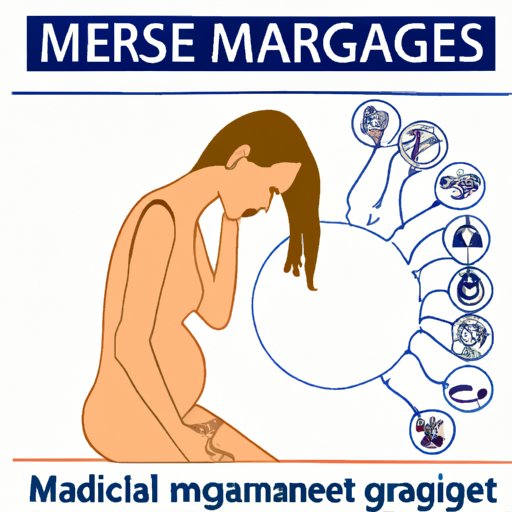Introduction
A miscarriage is defined as a pregnancy that ends on its own before the 20th week of gestation. It’s an emotionally difficult experience for many women and their families. In this article, we will explore when miscarriages occur most, the risk factors associated with them, the stages of a miscarriage, common causes, signs, symptoms, and treatment options.
Risk Factors for Miscarriage: What You Need to Know
There are several risk factors that may increase a woman’s chances of experiencing a miscarriage. These include: advanced maternal age (over 35), smoking, alcohol consumption, drug use, obesity, pre-existing medical conditions, and prior miscarriages. It is important to understand these risk factors in order to reduce the likelihood of a miscarriage.
Understanding Age-Related Risks
Age is one of the most significant risk factors for miscarriage. Women over the age of 35 have a higher risk of miscarriage than younger women. This is because older women are more likely to have chromosomal abnormalities in their eggs, which can lead to early pregnancy loss. Additionally, older women tend to have fewer eggs available for fertilization, which also increases their risk.

Understanding the Stages of a Miscarriage
A miscarriage can occur at any stage of pregnancy. In the early stages, it is known as an early miscarriage or a chemical pregnancy. This occurs when a fertilized egg implants in the uterus but fails to develop. Late-term miscarriages, or missed miscarriages, occur after the 12th week of pregnancy. These are usually caused by chromosomal abnormalities that prevent the fetus from developing properly.
How Common are Miscarriages?
Miscarriages are relatively common. Studies show that up to 25% of all pregnancies end in miscarriage. The rate is higher for women over the age of 35, with up to 40% of pregnancies ending in miscarriage. Additionally, women who have had multiple miscarriages or a family history of miscarriages are more likely to experience one.
The Most Common Causes of Miscarriage
The most common causes of miscarriage are chromosomal abnormalities, infections, and hormonal imbalances. Chromosomal abnormalities occur when there is a problem with the number or structure of chromosomes in the embryo. Infections such as listeriosis, rubella, and toxoplasmosis can also cause a miscarriage. Finally, hormonal imbalances can disrupt the normal development of the fetus and lead to a miscarriage.

Exploring the Impact of Age on Miscarriage
Women under the age of 35 are less likely to experience a miscarriage than older women. However, younger women may still be at risk due to lifestyle factors such as smoking, drinking, and drug use. On the other hand, women over the age of 35 are more likely to experience a miscarriage due to the increased risk of chromosomal abnormalities and fewer eggs available for fertilization.
Signs, Symptoms and Treatment Options for a Miscarriage
The signs and symptoms of a miscarriage vary depending on the stage of pregnancy. During an early miscarriage, a woman may experience vaginal bleeding, cramping, and abdominal pain. A late-term miscarriage may result in heavier bleeding, severe cramping, and passing of tissue. Treatment options depend on the stage of the miscarriage and may include medication to stop the bleeding, surgery to remove remaining tissue, or natural management.

The Role of Genetics in Miscarriage
Genetics can also play a role in miscarriages. Inherited genetic conditions such as Fragile X Syndrome or Turner Syndrome can increase the risk of miscarriage. Additionally, certain genetic disorders can cause chromosomal abnormalities in the embryo and lead to miscarriage. If you have a family history of genetic disorders, it is important to consult your doctor for testing.
Conclusion
Miscarriages can be a difficult and emotional experience for women and their families. By understanding the risk factors, stages, causes, signs, symptoms, and treatment options, women can be better prepared if they experience a miscarriage. Additionally, understanding the role of genetics can help women identify any potential inherited disorders that could increase their risk. If you have experienced a miscarriage or think you might be at risk, it is important to speak to your doctor for support and further information.


